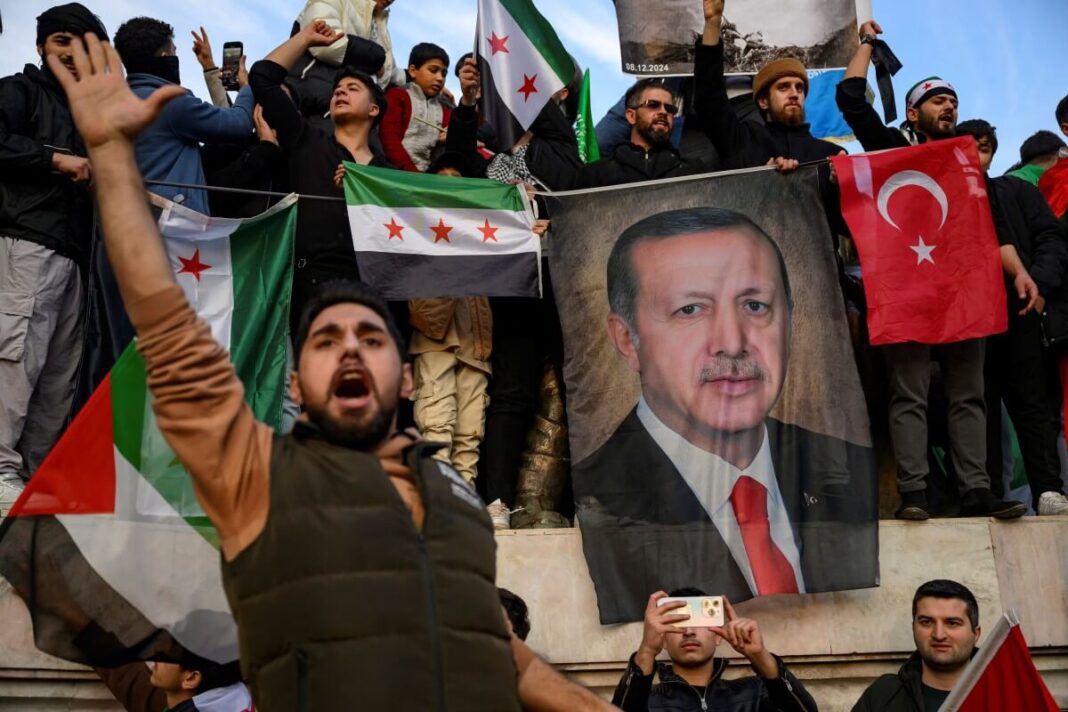With the fall of President Bashar al-Assad in neighboring Syria, Turkey has the chance to turn the overthrow of a historic adversary into greater regional clout, experts say.
“As the main backer of the rebels” who put an end to the Assad dynasty’s more than five-decade rule, “Turkey is the big regional winner,” said Paul Salem, vice president of the Middle East Institute think tank.
But as Assad’s ouster by the Islamist-led alliance plunges Syria into uncharted territory, “with that victory also comes responsibility to be part of a successful transition,” Salem added.
Foreign Minister Hakan Fidan on Sunday said Turkey was ready to “guarantee security” and “heal Syria’s wounds,” calling for a “smooth transition” of power.
With three million Syrians who fled from the country’s bloody civil war on Turkish soil, Ankara has skin in the game.
Fidan expressed hope that those refugees — whose presence has generated strong anti-Syrian sentiment in Turkey — could now return home.
“The prospect of return of Syrian refugees will boost support for” President Recep Tayyip Erdoğan in Turkey, said Gönül Tol, director of the Middle East Institute’s Turkish Program.
‘Syria’s new patron’
On the foreign policy front, Assad’s fall will reshuffle the cards Ankara has to play in its dealings with Russia, the deposed Syrian president’s key ally along with Iran, Tol argued.
Previously the war had made Ankara “vulnerable” to decisions taken in Moscow, the analyst said, with Russian bombing raids over the border in Syria’s northwest fueling fears of a new influx of refugees.
Now “Turkey will have the stronger hand in its relations with Russia,” she said.
Similarly Soner Çağaptay, senior fellow at the Washington Institute for Near East Policy, predicted that “Turkey’s influence will rise in Damascus, replacing that of Iran and Russia.”
Çağaptay argued that Ankara must now help the Islamist group Hayat Tahrir al-Sham (HTS), which led the rebel offensive, to “gain international recognition” and “kick Russia and Iran out.”
But that “won’t work if Turkey becomes Syria’s new patron,” he added.
By contrast Sinem Adar, of Berlin’s Center for Applied Turkey Studies, said it was “too early to tell” whether Turkey really had emerged the “winner” from Assad’s fall.
“Much depends on the dynamics among local actors, particularly the HTS and SDF,” Adar said, referring to the Kurdish-led Syrian Democratic Forces, as well as “the dynamics between HTS and Ankara.”
Kurdish ‘cleansing’
The upheavals in northern Syria also represent an opportunity for Turkey to push Kurdish forces away from its southeastern border.
Those include the Syrian Kurdish People’s Defense Units (YPG), allies of the West in the fight against the Islamic State group’s militants but regarded by Ankara as an offshoot of its sworn enemy, the outlawed Kurdistan Workers’ Party (PKK).
Last week, pro-Turkish fighters taking part in the rebel offensive regained control of the town of Tal Rifaat from Kurdish forces on the edge of a Turkish-occupied “security zone” in northern Syria.
The US-backed SDF meanwhile sought in the early days of the lightning assault to take advantage of the rebel offensive.
Having already controlled most of northeastern Syria, the SDF said on Friday its fighters had moved into eastern areas which troops loyal to Assad had left.
On Sunday, Turkey’s top diplomat Fidan again warned Kurdish militants against extending their influence in the country by “taking advantage of the situation.”
That comment came just as Turkish television announced that factions loyal to Ankara were “cleansing” the Manbij region northeast of Aleppo of the YPG’s presence.
Beyond pure security considerations, “Erdoğan can use a weakened YPG to burnish his nationalist image at home,” the Middle East Institute’s Tol said.
On the subject of how Ankara-allied militias clashing with US-backed Kurds would be viewed in Washington, “we are in contact with our American friends,” Fidan said.
“They know how sensitive we are on (the) YPG, PKK issue.”
© Agence France-Presse


